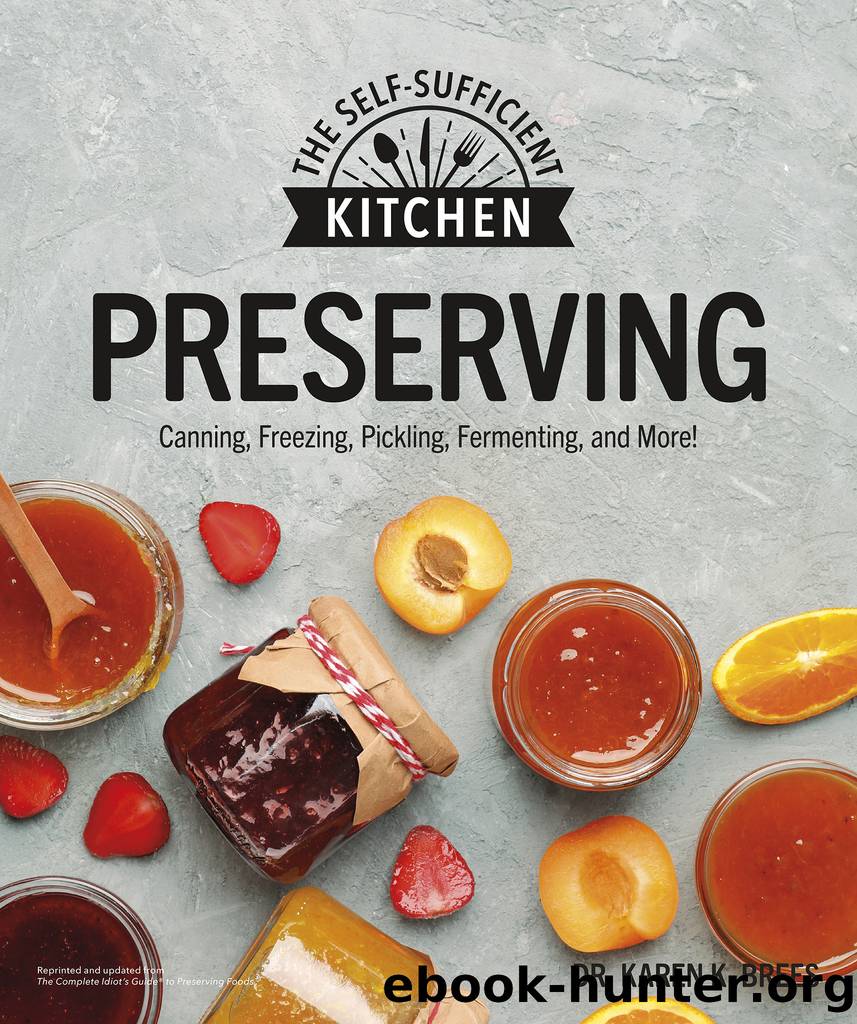Preserving by Karen K. Brees Ph.D

Author:Karen K. Brees, Ph.D.
Language: eng
Format: epub
ISBN: 9780744061789
Publisher: DK Publishing
Canning Game
Wild game is different from domestic meat. That seems obvious, but it bears some explanation. What are the differences? Domestic animals live in a controlled environment. Theyâre fenced in and fed or allowed to graze on specific pastures. They donât have to (or shouldnât have to) struggle to find sustenance. With their dietary needs more than satisfied, they put on weight. This means they have enough food to enable them to store the excess as fat. Fat makes meat tender and flavorful.
Wild game animals have a tougher life. Theyâre constantly on the search for food. They tend to be leaner, and as a result, their meat is tougher than their domestic cousinsâ. Pressure canning their meat solves the toughness problem but not the gaminess that some people find distasteful. So whatâs that gamey taste?
Not to put too fine a point on it, but after all, itâs game. It has its own particular flavor and aroma, and if youâre expecting venison to taste like beef, youâre going to be disappointed. But if youâre expecting venison to taste like venison, youâre going to be satisfied. If youâre an aficionado of game, you enjoy its distinctive taste and aroma.
That said, there are a couple of factors that contribute to a gamey taste and you can do something about both of them.
First of all, be sure the game is kept properly chilled after harvesting. Once the animal becomes warm, thereâs not much you can do to reverse the natural processes that lead to a disagreeable taste.
Second, be sure to remove all the fat. Especially with deer meat, fat can contribute to gaminess. It might seem contradictory because the fat on domestic animals doesnât make them taste gamey, but thatâs just the way it works.
Some people add a teaspoon or two of white vinegar while theyâre cooking venison and some people insist that soaking the meat in milk before cooking it works fine. Neither of these methods will cause any harm. Salt and tomato juice are also used, and theyâre discussed in a moment.
Before preparing game for canning, soak it for 60 minutes in a brine made from 1 tablespoon of kosher salt to 1 quart of water. This reduces the gamey taste. Then rinse and remove the large bones. Cut the meat into strips, chunks, or cubes.
For raw pack, pack the meat into jars, leaving 1 inch (2.5cm) of headspace. Donât add liquid. You can add 1 teaspoon of kosher salt to each jar for flavor, but itâs not necessary. Wipe the rims, adjust the lids, and process the jars in a pressure canner. See Appendix C for the processing times.
For hot pack, precook the meat until rare. You can stew it, roast it, or simply brown it in olive oil or fat. Then pack it into jars and cover with boiling broth, water, or tomato juice, leaving 1 inch (2.5cm) of headspace. Tomato juice is often used to deal with the gamey nature of game. Wipe the rims, adjust the lids, and process the jars in a pressure canner.
Download
This site does not store any files on its server. We only index and link to content provided by other sites. Please contact the content providers to delete copyright contents if any and email us, we'll remove relevant links or contents immediately.
My Pantry by Alice Waters(2609)
The Culinary Herbal by Susan Belsinger(2477)
Food and Water in an Emergency by Food & Water In An Emergency(2399)
Asian Pickles: China by Karen Solomon(2127)
Project Smoke by Steven Raichlen(2036)
Food Storage for Self-Sufficiency and Survival by Angela Paskett(2023)
Smoke & Spice by Cheryl Alters Jamison(1919)
The Jam and Marmalade Bible by Jan Hedh(1677)
Pure Charcuterie: The Craft & Poetry of Curing Meat at Home by Meredith Leigh(1649)
Fermented Vegetables by Kirsten K. Shockey(1551)
Asimov's Science Fiction 020111 by Dell Magazines(1548)
Economic Food Storage Strategies for Disaster Survival: Start Today and Have Enough Food Your Family Will Eat to Survive Any Disaster Without Going Broke by Sandy Gee(1538)
Asian Pickles by Karen Solomon(1491)
The Ideal Pantry: Your Comprehensive Guide to Food Remedies and Preservation Techniques by Ben Night(1448)
Canning for a New Generation by Liana Krissoff(1445)
The Healthy Meal Prep Cookbook: Easy and Wholesome Meals to Cook, Prep, Grab, and Go by Amidor RD CDN Toby(1422)
Not Just Jam: The Fat Pig Farm book of preserves, pickles and sauces by Evans Matthew(1407)
The Complete Guide to Drying Foods at Home: Everything You Need to Know About Preparing, Storing, and Consuming Dried Foods by Paajanen Terri(1350)
Jams, Preserves and Chutneys by Marguerite Patten(1342)
